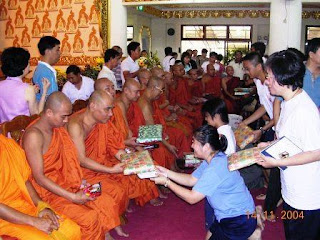Truth About Dukkha
 Impermanence is a keynote in the Buddha's teachings. Down to the smallest dust speck, nothing is permanent. If it was't so, the Buddha had said, then there is nothing to practice for. Everything is conditioned, due to cause and condition joining together to create an effect, different combinations of different conditions giving rise to different effects.
Impermanence is a keynote in the Buddha's teachings. Down to the smallest dust speck, nothing is permanent. If it was't so, the Buddha had said, then there is nothing to practice for. Everything is conditioned, due to cause and condition joining together to create an effect, different combinations of different conditions giving rise to different effects.In many of His suttas, He tell us to reflect on our condition: Subject to parents who have died or will die one day, how could we ourselves then be permanent?? We therefore cannot progress any further in right understanding without first understanding the first of the Four Noble Truth: The Truth of suffering.
The Buddha never used words casually. In this case His choice of the word dukkha had a purpose to show the cause of life. Here it means not so much the suffering of aches and pains but "du" (to be disgusting) + "kkha" (nothing, empty): that is what we assume to be doesn't exist. What we take to be a person, as self-existing, permanent entity, is actually only mind-and-matter.
What we had tought to be an "I" are only mental states and material qualities acting together to produce energy so that we think, talk and act. We are only phenomena and energy in the guise of a compact living being we think ourselves to be. For instance, we think we are sitting in a chair reading, apparently solid and still, yet our mental and material processes are running and ceasing all the time, like a river current flowing non-stop.
What arises and falls constantly as a conditioned thing or samkhara = sam (joining together) + khara (work) can only be reliable. It is disturbing and unsatisfactory because what we wish for cannot be realized.
Seeing things in this way, seeing thing as they really are, can we remain satisfied anymore?? Right vision may not be a cause for enjoyment, yet it leads to cessation of suffering, once we penetrate the truth of suffering to clear away all doubt and wrong views about the Dhamma for good.
Everyone likes happiness and dislikes unhappiness. It is a bad situation to search for something - especially if it is just a feeling that is only momentary. If we want to have more of this feeling of happiness, this can lead to more craving. Unhappiness too leads ro craving, if we want more to be rid of our unhappiness. What is the cause of problems and dissatisfaction in our life? It is the desire or attachment that brings them about. Without cause, no attachment can arise.
Craving and ignorance of the Dhamma are the two roots of cyclic existence. They firmly root and fortify our tree of unwholesomeness and mental defilement. and it all begins with feeling. People exclaim "Oh, how delightful, I am so happy", on seeing a nice and desirable object and that certainly leads to craving.
Craving has the aspect of enjoyment or taking delight in. All tanhas are alike in this respect. That is its nature, like heat is the nature of fire. So wherever it appears, tanha enjoys here, there anywhere. IT joins mind and its object together like two sheets of paper with tanha glue sticking over us.
So, if we see something desirable, our mind starts wanting to see it again and again. This attachment like glue or a cord binds us together with the object. Even people who take on awesome, dangerous task (like climbing the Mount Everest for an example) - when they could easily stay in comfort and safety at home - are led by tanha.
Three forms of tanha can be distinguished:
- sensual pleasure given our five senses thus craving for nice sight, sound, smell, taste and touching,
- craving to be reborn and so to always remain in the cycle of rebirth. Those with this usually hold the view of eternalism,
- craving to end life in the belief of annihilation.
What can be done with desire and craving giving rise to dukkha? If there is dukkha, the Buddha said, there must certainly be its end as all conditioned thing cease at Nibbana.
It is like us wanting to drive somewhere, we first need to know how to drive. We need not actually need to know about the car's mechanism and how it runs. In the same way, if we want to end suffering, we must first know at least how to walk to the path as taught by the Buddha.



Comments